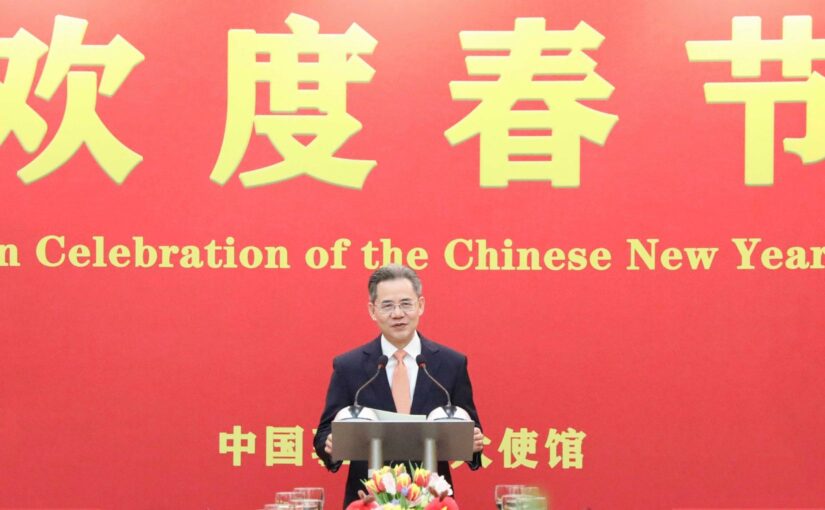On February 21, the Chinese Embassy in London organised a lunch and round table discussion for representatives of fraternal parties and other British friends of China to celebrate the Lunar New Year and to explore the topic of building a shared future for humanity along with the other major themes raised at the Central Conference on Work Related to Foreign Affairs, held in Beijing last December.
In his keynote report, Ambassador Zheng Zeguang first dealt with economic developments. China’s economy, he noted, had become greener, the middle income group had already reached 400 million, and Premier Li Qiang has noted that it will reach 800 million in five years. There were intensified efforts to sort out the problems in the real estate market.
On foreign policy, the Ambassador laid particular stress on high quality Belt and Road (BRI) developments, the historic reconciliation between Iran and Saudi Arabia, brokered by China, China’s contribution to the UAE consensus on climate change reached at COP 28, along with China’s role in the Global South, championing the expansion of the BRICS cooperation mechanism and the African Union’s admission to the G-20.
China’s policy, he explained, was to promote peace and oppose war. Without peace there could be no development and peace can only be possible if the independence and territorial integrity of nations was defended. It was further necessary to uphold mutual learning and to oppose ideas of a clash of civilisations.
Friends of Socialist China was represented by our co-editor Keith Bennett along with committee member Dr. Ali Al-Assam. In his contribution, Keith laid stress on how President Xi’s concept of a community with a shared future for humanity, which is described as the core tenet of Xi Jinping Thought on Diplomacy, embodies Xi’s concept of the “two integrations”, namely the integration of Marxism with China’s specific realities and especially the best of its traditional culture.
Other speeches were made by Robert Griffiths, General Secretary of the Communist Party of Britain (CPB); Andy Brooks, General Secretary of the New Communist Party of Britain (NCP); Christina Kostoula, Vice Chair of the Communist Party of Great Britain (Marxist-Leninist) (CPGBML); Wang Qi, Minister of the Chinese Embassy; Stephen Perry, Honorary President of the 48 Group Club; Right Honourable Lord Davidson KC of Glen Cova, Labour Member of the House of Lords; Martin Albrow, Fellow of Britain’s Academy of Social Sciences; Martin Jacques, author of the best selling ‘When China rules the world’; Sam Daws, Director of the Project on UN Governance and Reform at the Centre for International Studies, University of Oxford; and Hugh Goodacre, Secretary of the Xi Jinping Thought Study Group of the Institute for Independence Studies.
Further contributions were made in discussion by Roger McKenzie, Foreign Editor of the Morning Star; and Ali Al-Assam of Friends of Socialist China.
The below article was originally published on the website of the Chinese Embassy in the UK. It is followed by the full text of Keith’s contribution to the discussion.
The Chinese Embassy in the UK Holds a Chinese New Year Luncheon for Representatives of British Political Parties to Discuss China’s Practice and the Global Significance of Building a Community with a Shared Future for Mankind
On 21 February 2024, the Chinese Embassy in the UK invited representatives from various British political parties and people from different sectors for a Chinese New Year luncheon. H.E. Ambassador Zheng Zeguang delivered a keynote address and the other participants shared their views. While celebrating the Chinese New Year, the participants engaged in in-depth discussions on China’s practice and the global significance of building a community with a shared future for mankind.
In his address, Ambassador Zheng pointed out that building a community with a shared future for mankind is the core tenet of Xi Jinping Thought on Diplomacy. It is the Communist Party of China (CPC)’s answer to the question of what kind of world we should build and how to build it. It is also the noble goal pursued by China in conducting major country diplomacy with Chinese characteristics in the new era.
Ambassador Zheng elaborated on the goal, the pathway, the guiding principle, the basic underpinning, the strategic guidance and the platform for building a community with a shared future for mankind. He pointed out that building a community with a shared future for mankind has developed from a conceptual proposition to a scientific system, from a promising vision to substantive actions and from a Chinese initiative to an international consensus. Extending to various regions and covering various areas, it has served as a glorious banner leading the progress of the times.
Ambassador Zheng noted that over the past year, China continued to steadfastly advance the building of a community with a shared future for mankind through practical actions. China’s economy grew by 5.2%, contributing about one-third of the global economic growth. China’s rapid green and low-carbon transition propelled global sustainable development. And China shared more development opportunities with the world through expanded high-level opening up.
China made active efforts to improve relations between other major countries, successfully mediated a historic reconciliation between Saudi Arabia and Iran, and played a constructive role in addressing regional hotspots such as the Palestine-Israel conflict and the Ukraine crisis, making new contributions to world peace.
China actively contributed to the UAE Consensus at the COP28 UN Climate Change Conference, enhanced solidarity of the Global South, promoted the historic expansion of BRICS and gave support to the African Union in joining the G20, playing an important role in improving global governance.
Continue reading Chinese Embassy in London organises round table discussion on building a shared future for humanity
